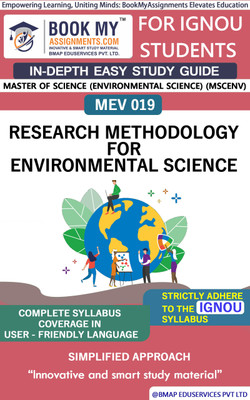IGNOU MEV 19 Research Methodology for Environmental Science Study Guide (In Depth Guide) for Ignou Student(Paperback, BMA Publication)
Quick Overview
Product Price Comparison
IGNOU's MEV 19 (Research Methodology for Environmental Science) course involves understanding the principles, methods, and techniques used in environmental research. Here's an in-depth guide to help you excel in your studies:Review the Syllabus: Start by thoroughly reviewing the syllabus provided by IGNOU for the MEV 19 course. This will outline the topics you need to cover and the structure of the course.Study Material: Utilize the study materials provided by IGNOU for the course. These materials typically cover fundamental concepts in research methodology, including research design, data collection methods, data analysis techniques, and scientific writing.Textbooks and References: Supplement your study materials with textbooks and reference books on research methodology and environmental science. Some recommended textbooks include "Research Methods in Environmental Science" by Paul G. Harris, "Research Design: Qualitative, Quantitative, and Mixed Methods Approaches" by John W. Creswell, and "The Craft of Research" by Wayne C. Booth, Gregory G. Colomb, and Joseph M. Williams.Understanding Research Methodology: Research methodology involves the systematic process of planning, conducting, analyzing, and interpreting research studies. Study different research paradigms, approaches, and methods used in environmental science research.Research Design: Learn about different types of research designs, including experimental, observational, descriptive, correlational, and qualitative research designs. Understand how to select an appropriate research design based on the research questions, objectives, and context.Sampling Techniques: Explore various sampling techniques used in environmental research, such as random sampling, stratified sampling, systematic sampling, cluster sampling, and purposive sampling. Understand how to determine sample size and ensure sample representativeness.Data Collection Methods: Study different methods of data collection used in environmental research, including surveys, interviews, questionnaires, observations, experiments, field measurements, and archival research. Learn about the strengths and limitations of each method.Data Analysis Techniques: Familiarize yourself with quantitative and qualitative data analysis techniques used in environmental research. Study statistical methods, software tools, and analytical approaches for analyzing quantitative data, as well as coding, thematic analysis, and content analysis for qualitative data.


